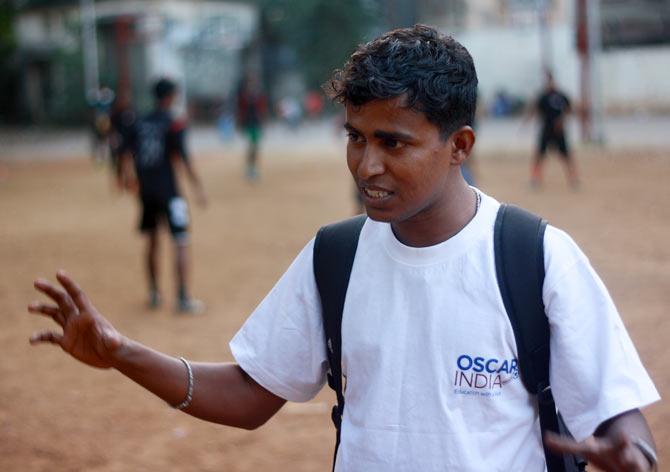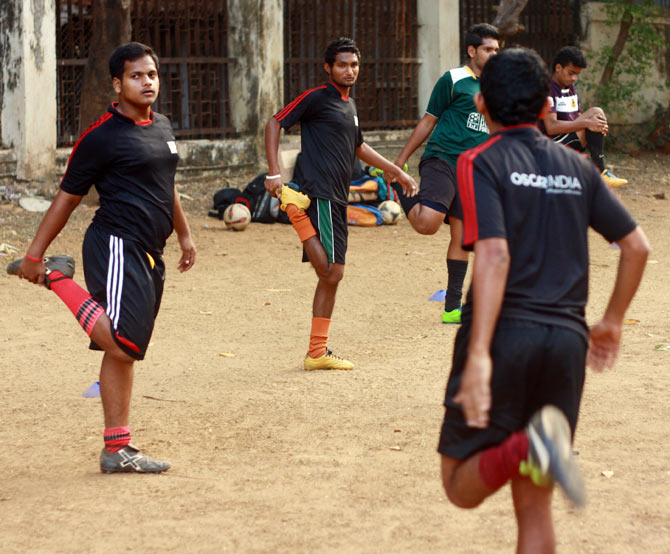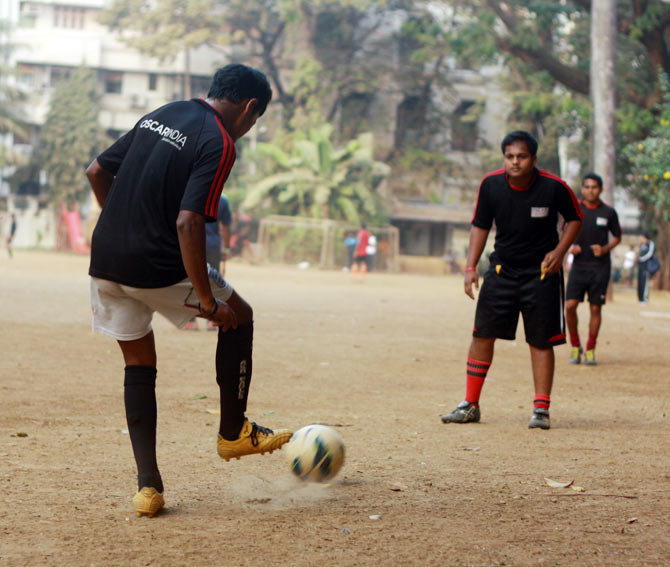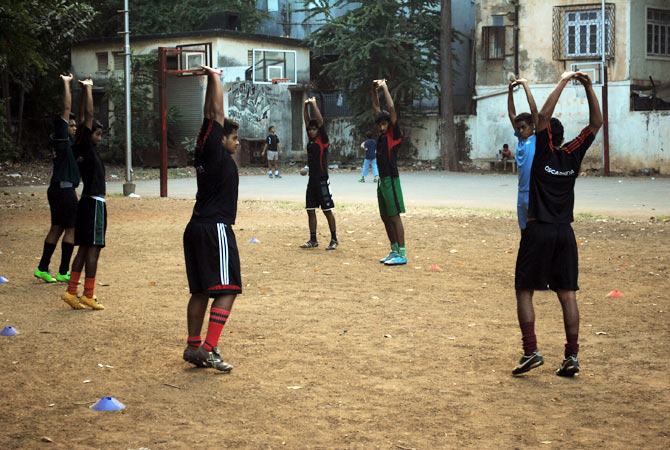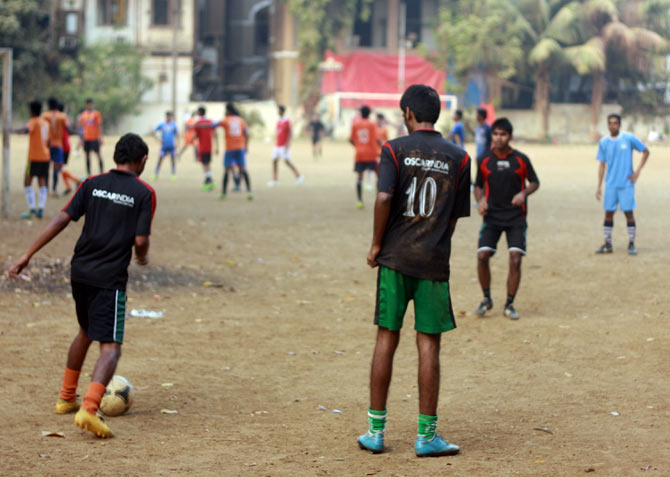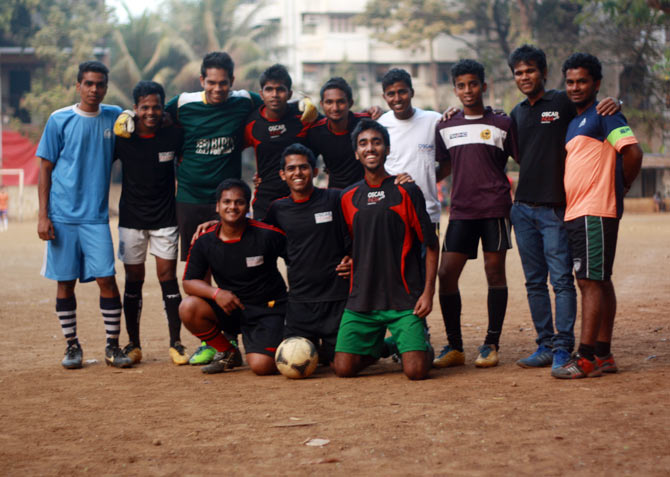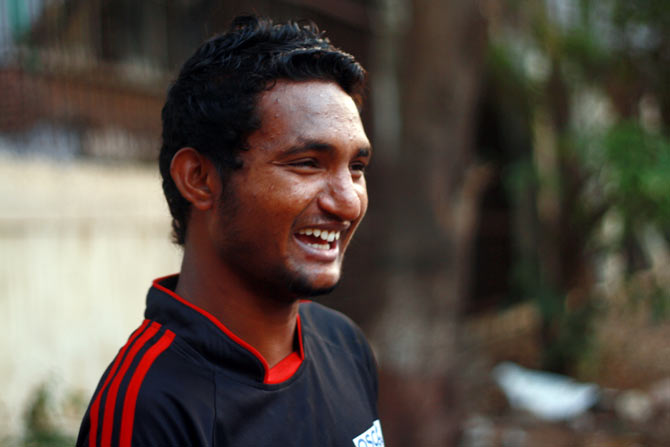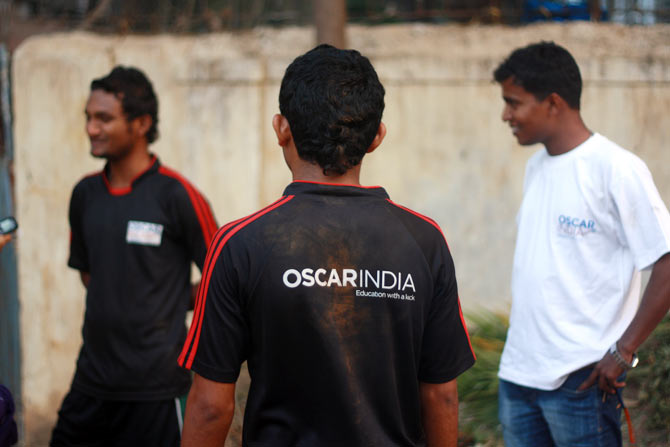 | « Back to article | Print this article |
Football's Slumdog Superstar
He started out in 2006 with a solitary ball, hoping to bring about a change in the lives of 18 young boys.
Today, with over 350 kids under his care, Ashok Rathod has succeeded in his mission of changing lives through the beautiful game of football, discovers Rediff.com's Laxmi Negi.
Ashok Rathod, it is evident, has had a hard life.
He is just 24 years old, but his body language exhibits an unusual level of maturity.
Years of living -- and battling the problems he had faced -- in Colaba’s Ambedkar Nagar slums had taught this south Mumbai lad one unforgettable lesson: The good things in life don’t just fall into your lap; you have to work hard for them.
It was a lesson that he wanted to teach the children in his community.
A compelling reason had prompted this decision.
Please click on Next to read more...
Saving lives, one kick at a time
Welcome to 2006.
Drugs. Drinking. Gambling.
This was how many of the men at Ambedkar Nagar were wasting away their lives. This is what the children of Ambedkar Nagar were exposed to. And this was how they had chosen to live their lives as well.
Except for Ashok. He was not willing to sit and watch them smoke their lives away. He was determined to make a different. With his own unique weapon.
A football.
He managed to convince 18 children that if they wanted to change their lives, all they had to do was play.
And play they did. It was fun. It was healing. The children began to see a light that glowed brighter than the call of the three vices that plagued their lives.
Word of this mission, run by a teenager, spread. More and more children came to join.
Ashok was in a quandary. He wanted to take on as many children as possible, but he did not have the money to buy more footballs.
Please click Next to read more...
Renew, Reuse, Recycle
Jugaad -- that unique Indian solution to most problems -- provided the answer.
Ashok went ball hunting. He collected torn, worn-out balls. He repaired them and found ways to make them playable once again.
The motley group increased in strength.
Funds were still an issue.
Ashok, who refused to be bogged down by any problem, decided the time had come to register his ‘informal NGO’.
This way, they would be eligible for funding.
The NGO needed a name.
Please click Next to read more..
OSCAR, just OSCAR
OSCAR, Ashok told the registrar of societies. That’s what he wanted to call his group.
The registar refused; the title, it was felt, was similar to the awards presented by the American Academy of Motion Pictures.
Ashok was calm, and determined to have his way.
Oscar, he explained, was the only name they wanted. He and his friends had thought of a host of names for their ‘NGO’ and this was the best.
He even explained why. When the youngsters who had signed up with Ashok were asked to decide a name for the group, they immediately thought of the one honour actors across the world as aspire to – the Oscars.
That’s how the Organisation for Social Change Awareness and Responsibility was born.
Each little victory enthused Ashok even more and his reach widened.
Please click Next to read more...
A messiah, and an award!
Just when Ashok thought his efforts were bearing fruit, he ran into a new roadblock.
His family and friends, who were getting more and more concerned about his future, wanted him to look out for himself instead of being a messiah for his neighbourhood.
It was, in that sense, a difficult time for Ashok.
Then, in 2009, he was among 24 Indians chosen as 'Real Heroes' by the CNN-IBN television channel. He received his award from superstar Aamir Khan in 2009.
It proved to be the turning point in his life.
His hard word and dedication were now recognised. The community started taking him seriously. The elders, who suspected Ashok’s actions, were reassured.
With the award money (after taxes, he got Rs 3.5 lakhs of the original Rs 5 lakhs), Ashok could now afford to rent a 10 x 10 space that now functions as the OSCAR office.
The number of computers has increased to three.
There is a steady flow of volunteers who teach these youngsters and help them with their studies.
And yes, football continues to be a huge attraction… for those who need help and for those who want to help.
Please click Next to read more...
No money? Just run
OSCAR continues to grapple with shortage of funds.
Recently, one of Ashok’s well-wishers recommended the Standard Chartered Mumbai Marathon as a possible solution.
This, Ashok thought, was a jugaad that could work.
He hoped the charity run would help raise the money OSCAR needed to meet the expenses incurred in helping underprivileged children reach for a better life.
"The Mumbai Marathon," which they ran for the first time this year, he says, "was an eye-opener. It was a learning experience. We will be back next year and we will be even stronger."
They were provided 15 bibs by the SCMM.
Ashok hopes OSCAR will raise Rs 1,50,000 but will have to wait until June 2014 to find out whether this jugaad paid off. This is when SCMM gives the charities the money that has been raised through the run.
Please click on NEXT to read more...
No more drugs. No more gambling
Ashok has never put himself first.
If he had, he would have been making his way up the ladder at the NGO Magic Bus. He had started working there at a young age for a salary of Rs 2,000 a month.
But he could not ignore the call of his community; he could not watch the youngsters waste their lives away.
Ashok’s efforts have not gone in vain.
The changes in the youngsters – who were, once, letting drugs and gambling waste their future – is stark.
They no longer abuse anyone or use foul language.
They don’t gamble, drink or abuse drugs.
They have more interesting things that vie for their attention – like football.
Please click Next to read more...
'I want to follow in Ashok's footsteps'
Today, 350 boys have enrolled with OSCAR. The fact that some of them play in the third division of the Mumbai District Football Association League is testimony to Ashok’s fierce determination.
Sixteen-year-old Maruti Chavan would have, under normal circumstances, been a school dropout. Today, he exemplifies the OSCAR success story and is preparing for his Class X exams.
He dreams of becoming a professional football player and, to this end, keeps an eye on trials for new players conducted by city-based clubs like the Mumbai Football Club and Air India.
"There is pressure from my family to find a job,” he says. “But, for now. I have managed to convince them that football is my future."
Kumar Rathod is one of the youth leaders at OSCAR. A first year Commerce undergraduate, he funds his studies with the he receives from the OSCAR foundation.
"I want to follow Ashok’s footsteps," he says, when asked about his future plans
Please click Next to read more...
Learning to play, learning to live
Ashok says, “My first overseas trip was to Jordan, and it happened because of the OSCAR Foundation. It was in Jordan that learnt to use sports for complex reservation in a community.
“In 2011, I travelled to United Kingdom to attend a course on how football can increase awareness and reduce HIV stigma.”
There is a gleam of satisfaction in Ashok’s eyes when he looks at his team practising.
"When I started,” he smiles, “I wanted to teach these boys how to play football and live a better life. But I must confess I have learnt a lot from them."
